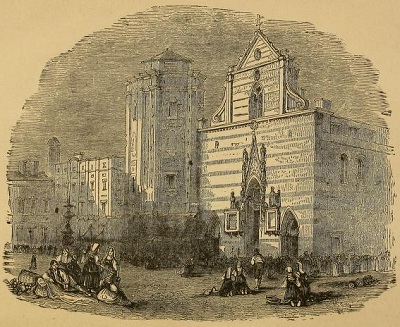| directory |
| home | contact |
|
|||||||||||||||
| search | |||||||||||||||
Shakespeare's Sources for Much Ado About NothingFrom Much Ado About Nothing. Ed. William J. Rolfe. New York: American Book Co.The earlier incidents of the serious portion of the plot may have been taken from the story of Ariodante and Ginevra in Ariosto's Orlando Furioso, canto v.; where Polinesso, in order to revenge himself on the princess Ginevra (who has rejected his suit and pledged her troth to Ariodante) induces her attendant Dalinda to personate the princess and to appear at night at a balcony to which he ascends by a rope-ladder in sight of Ariodante, whom he has stationed there to witness the infidelity of Ginevra. A translation of this story by Peter Beverley was entered on the Stationers' Registers in 1565-6, and was doubtless printed soon afterwards; and in 1582-3 "A History of Ariodante and Geneuora" was "shewed before her Magistie on Shrovetuesdaie at night, enacted by Mr. Mulcasters children." According to Sir John Harrington, the same story had been "written in English verse" by George Turbervile, before the publication of his own translation of the Orlando in 1591. Spenser had also introduced the tale, with some variations, in the Faerie Queene (ii. 4. 17 fol.), and this part of the poem was published in 1590. It is more probable, however, that the source from which Shakespeare drew this part of his materials was the 22d Novel of Bandello, which had been translated into French by Belleforest in his Histoires Tragiques (see our ed. of Hamlet, p. 13), and probably also rendered into English, though the version has not come down to our day. In Bandello's story, as in the play, the scene is laid at Messina; the father of the slandered maiden is Lionato; and the friend of her lover is Don Piero, or Pedro. How closely the poet has followed the novel will be seen from the outline of the latter given by Staunton: "Don Piero of Arragon returns from a victorious campaign, and, with the gallant cavalier Timbreo di Cardona, is at Messina. Timbreo falls in love with Fenicia, the daughter of Lionato di Lionati, a gentleman of Messina, and, like Claudio in the play, courts her by proxy. He is successful in his suit, and the lovers are betrothed; but the course of true love is impeded by one Girondo, a disappointed admirer of the lady, who determines to prevent the marriage. In pursuance of this object, he insinuates to Timbreo that Fenicia is false, and offers to show him a stranger scaling her chamber window. The unhappy lover consents to watch; and at the appointed hour Girondo and a servant in the plot pass him disguised, and the latter is seen to ascend a ladder and enter the house of Lionato. In an agony of rage and jealousy, Timbreo in the morning accuses the lady of disloyalty, and rejects the alliance. Fenicia falls into a swoon; a dangerous illness supervenes; and the father, to stifle all rumours hurtful to her fame, removes her to a retired house of his brother, proclaims her death, and solemnly performs her funeral obsequies. Girondo is now struck with remorse at having 'slandered to death' a creature so innocent and beautiful. He confesses his treachery to Timbreo, and both determine to restore the reputation of the lost one, and undergo any penance her family may impose. Lionato is merciful, and requires only from Timbreo that he shall wed a lady whom he recommends, and whose face shall be concealed till the marriage ceremony is over. The denouement is obvious. Timbreo espouses the mysterious fair one, and finds in her his injured, loving, and beloved Fenicia." The comic portion of the play is Shakespeare's own, as indeed is everything else in it except this mere skeleton of tragic incident. Claudio and Hero, Don Pedro and Don John, are as really his own creations as Benedick and Beatrice, Dogberry and Verges, who have no part in Bandello's novel or Ariosto's poem. As Knight remarks, "Ariosto made this story a tale of chivalry, Spenser a lesson of high and solemn morality, Bandello an interesting love-romance; it was for Shakspere to surround the main incident with those accessories which he could nowhere borrow, and to make of it such a comedy as no other man has made — a comedy, not of manners or of sentiment, but of life viewed under its profoundest aspects, whether of the grave or the ludicrous." How to cite this article:____ Related Articles The Merchant of Venice, Romeo and Juliet and the Histories |

|
©1999-2021 Shakespeare Online. All Rights Reserved.